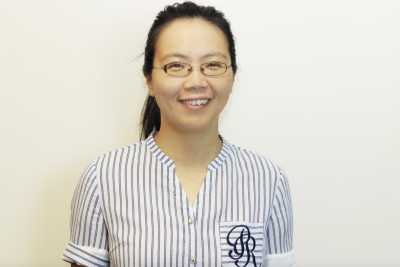Liao, associate professor in the School of Mathematics, will lecture on machine learning and deep learning at the American Mathematical Society (AMS) Southeastern Sectional Meeting on March 23-24, 2024, at Florida State University in Tallahassee.
Jan 10, 2024
Wenjing Liao, associate professor in the School of Mathematics, joins a long list of faculty members who in recent years have been invited to take part in the American Mathematical Society’s Spring Southeastern Sectional Meetings, with the 2024 version scheduled for March 23-24 at Florida State University.
Liao’s expertise in artificial intelligence — specifically machine learning and deep learning — earned her the invitation to give one of three addresses at the March AMS meeting. Liao will present some statistical learning theory of deep neural networks where data are concentrated on or near a low-dimensional manifold. (Low- and high-dimensions refer to the number of key features versus observations in a dataset.)
“When data are sampled on a low-dimensional manifold, the sample complexity crucially depends on the intrinsic dimension of the manifold, which demonstrates that deep neural networks are adaptive to low-dimensional geometric structures in data,” Liao says.
Liao is organizing a separate special session on mathematical advances in machine learning during the meeting. Two School of Mathematics visiting assistant professors are also organizing special sessions: Papri Dey’s session is on combinatorics of geometry in polynomials, and Austin Christian’s will focus on topological interactions of contact and symplectic manifolds.
“For Wenjing to give a presentation like this at an AMS Spring Southeastern Sectional meeting, at this early stage of her career, speaks volumes about the impact her research into machine learning and especially low dimensional loci within data is having on the field,” says Michael Wolf, professor and chair of the School of Mathematics.
“It is my honor and privilege to speak at the Sectional Meeting,” Liao says. “This is a great opportunity for me to share our research on deep learning theory with the community.”
Georgia Tech and AMS Connections
Last spring the School of Mathematics hosted the AMS 2023 Southeastern Sectional Meeting, which saw alumna Blair Dowling Sullivan (MATH 2003) deliver one of four invited addresses.
Several former and current faculty and graduate students and postdoctoral scholars also organized special sessions and lectures during the AMS 2023 meeting, including Christine Heitsch, Kevin Shu, Mehrdad Ghadiri, Brandon Jerome Legried, Gong Chen, Ryan Dickmann, Abdoul Karim Sane, Dan Margalit, Benjamin Jaye, Naga Manasa Vempati, Galyna Livshyts, Orli Herscovici, Anton Bernshteyn, Matthew Powell, Burak Hatinoglu, Zhiyu Wang, Xingxing Yu, Miriam Kuzbary, Jon Simone, and Nur Saglam.
“We were excited and proud to host approximately 800 mathematicians on campus for the March AMS Southeastern Sectional Meeting,” Wolf shares. “It cemented for us just how important these regional conferences are in our discipline. We got to hear the latest on issues like combinatorics, the intersection of math and biology, and quantum systems. We look forward to continuing our regional relationships at the upcoming meeting at Florida State.”
Wolf says other current and past School of Mathematics faculty who have spoken at previous AMS Sectional meetings include Professors Matt Baker, Greg Blekherman, Rafael de la Llave, John Etnyre, Heitsch, Michael Lacey, Michael Loss, Margalit, Dana Randall, Prasad Tetali, Robin Thomas, Wolf, and XingXing Yu.
About Wenjing Liao
Liao received her Ph.D. in Applied Mathematics at the University of California, Davis, and joined Georgia Tech in 2017. In addition to machine learning, her research interests include imaging, signal processing, and high-dimensional data analysis.
Liao was also part of the Georgia Tech contingent attending this summer’s International Conference for Machine Learning in Honolulu. She recently won a U.S. Department of Energy (DOE) Early Career Award for her work on how deep learning might be leveraged to make mathematical advances in achieving more efficient modeling techniques.
Liao’s machine learning research also won her a National Science Foundation (NSF) Faculty Early Career Development Program (CAREER) Award in 2022.
Machine learning versus deep learning
While machine learning relies on algorithms to search for predictability and patterns in sets of structured data, deep learning algorithms imitate how the brain’s neural networks work to find patterns in large sets of unstructured data.
“It is a common belief that deep neural networks are capable of learning various geometric structures hidden in data sets,” Liao said. “One of the central interests in deep learning theory is to understand why deep neural networks are successful, and how they utilize low-dimensional data structures.”
Liao’s upcoming AMS address, “Exploiting Low-Dimensional Data Structures in Deep Learning,” will discuss how deep learning leverages low dimensional data structures and achieves great success.



